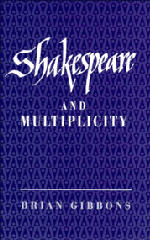Book contents
- Frontmatter
- Contents
- Acknowledgements
- 1 Introduction
- 2 Fabled Cymbeline
- 3 A speechless dialect: interpreting the human body in Shakespeare's plays
- 4 Shakespeare's ‘road of excess’: Titus Andronicus, The Taming of the Shrew, King Lear
- 5 Always topical: Measure for Measure
- 6 Amorous fictions in As You Like It
- 7 Unstable Proteus: Marlowe and Antony and Cleopatra
- 8 Multiplicity
- Notes
- Bibliography
- Index
7 - Unstable Proteus: Marlowe and Antony and Cleopatra
Published online by Cambridge University Press: 30 September 2009
- Frontmatter
- Contents
- Acknowledgements
- 1 Introduction
- 2 Fabled Cymbeline
- 3 A speechless dialect: interpreting the human body in Shakespeare's plays
- 4 Shakespeare's ‘road of excess’: Titus Andronicus, The Taming of the Shrew, King Lear
- 5 Always topical: Measure for Measure
- 6 Amorous fictions in As You Like It
- 7 Unstable Proteus: Marlowe and Antony and Cleopatra
- 8 Multiplicity
- Notes
- Bibliography
- Index
Summary
In Hero and Leander and The Tragedy of Dido Queen of Carthage Marlowe is lyrical and heroic, yet indulges in wilful exuberance. He is playfully and recklessly indecorous, he wittily elicits latent – and often unexpected – energies. In this he is anticipated by Arthur Golding, his precursor in the art of Englishing Ovid. In Golding there is a delight in multiplicity, not only as an informing aesthetic, but as a continuous local effect in the tone, texture, and manner of poetry. The Elizabethans admired Ovid for his ‘unclassical’ qualities – ‘his lack of reticence, his copiousness, his facile wit, his command of a polished and complex surface texture and of an easily imitable rhetoric’
Golding is full of pre-echoes both of Hero and Leander and The Tragedy of Dido. His translation of the story of Phaeton, from the second book of the Metamorphoses, begins in simple declamatory terms:
The princely palace of the sun stood gorgeous to behold
On stately pillars builded high of yellow burnish'd gold,
Beset with sparkling carbuncles that like to fire did shine.
(1–3)This scene comes to life with Vulcan's picture, wrought on the silver doors, of the sea and sea gods:
Loud sounding Tryton with his shirl and writhen trump in hand:
Unstable Protew changing aye his figure and his hue,
From shape to shape a thousand sithes as list him to renew:
Aegeon leaning boistrously on backs of mighty whales
And Doris with her daughters all: of which some cut the wales
With splayed arms, some sate on rocks and dried their goodly hair,
And some did ride upon the backs of fishes here and there.
(12–18)- Type
- Chapter
- Information
- Shakespeare and Multiplicity , pp. 182 - 202Publisher: Cambridge University PressPrint publication year: 1993



